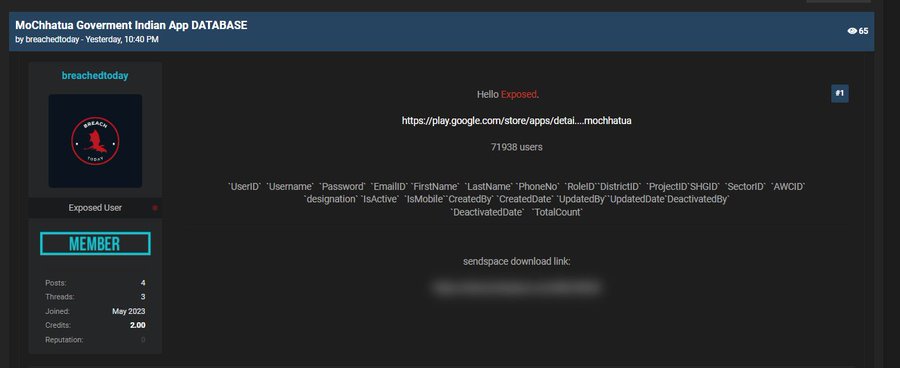In the latest string of cyber attacks in India, MoChhatua, a regional government app designed to facilitate public distribution services, has come under the radar of a hacking forum user.
The user has personal to have accessed and posted the database of MoChhatua. According to the threat actor, the MoChhatua data violate exposes sensitive information of the app’s users, including names, emails, passwords, and more.
MoChhatua app is an initiative of the regional department of women and child minutiae of the Indian state of Odisha.
The app helped in digitalizing and managing the supply of “Chhatua” or ration to the beneficiaries in the Indian state. The word ‘MoChhatua’ ways my ration.
The Cyber Express team has reached out to the state government of Odisha to personize the MoChhatua data breach. However, at the time of writing, we did not receive an official response from them.
FalconFeedsio on Twitter
Falcon Feeds, a threat intelligence service, took to Twitter to share the latest update on the incident, accompanied by a screenshot of the threat actor’s post.
The post not only revealed the exposed data but moreover included a download link to wangle the information that was stolen during the MoChhatua data breach.
MoChhatua data violate and the rise of hacking incidents in India
The hacker’s forum post provides a glimpse into the extent of the theMoChhatua data breach.
The so-called database contains detailed user information, including “UserID,” “Username,” “Password,” “EmailID,” “FirstName,” “LastName,” “PhoneNo,” “RoleID,” “DistrictID,” “ProjectID,” “SHGID,” “SectorID,” “AWCID,” “designation,” “IsActive,” “IsMobile,” “CreatedBy,” “Created Date,” “UpdatedBy,” “Updated Date,” “DeactivatedBy,” “DeactivatedDate,” and “TotalCount.”
The MoChhatua data violate is just one example of the growing threats faced by government agencies in India.
India has witnessed a substantial surge in such malicious activities. A recent report by cybersecurity firm CloudSek reveals that India emerged as the most targeted country in 2022, with an viperous doubling of cyber attacks targeting government agencies.
In 2022, the country witnessed increased cyber attacks from various fronts, the report attributed this rise to the activities of a Malaysia-based hacktivist group tabbed Dragon Force.
Incidents like the so-called MoChhatua data violate and the activities led by hacker collectives such as Dragon Force are a rationalization of snooping for the country and its defense versus evolving cyber threats.
Rise of phishing campaigns in India
Phishing campaigns have moreover emerged as a significant snooping for Indian government agencies. The report highlighted an increase in targeted phishing attacks versus these entities.
Hackers employ sophisticated techniques to deceive unsuspecting individuals and proceeds unauthorized wangle to sensitive information. Vigilance and robust security measures are crucial to counter these evolving threats effectively.
Moreover, ransomware attacks have seen a concerning rise globally, with governments stuff prime targets. The findings indicate that ransomware groups rumored for 6% of attacks on government entities.
LockBIT, a notorious ransomware operator that offers ransomware-as-a-service (RaaS), has emerged as a prominent player in this domain.
Government agencies in the United States, Canada, and Italy have fallen victim to LockBIT’s campaigns. Recent developments include the trespassing of a Russian national in Canada suspected of involvement in LockBIT ransomware attacks on US targets.
The MoChhatua data violate underscores the need for governments to prioritize cybersecurity and fortify their digital infrastructure.
MoChhatua data breach: The need for largest cybersecurity measures
The challenges posed by cyber threats are multifaceted, requiring collaborative efforts between government bodies, cybersecurity experts, and technology companies. Strengthening cybersecurity frameworks, investing in wide threat detection systems, and fostering a cyber sensation and education culture is vital to towers a resilient digital ecosystem.
By embracing a proactive tideway to cybersecurity, India can protect its citizens, infrastructure, and vital digital resources from the ever-present dangers lurking in the digital realm.
In conclusion, the MoChhatua data violate serves as a wake-up call, reminding governments worldwide of the urgent need to strengthen their cybersecurity defenses.
With cyber threats rhadamanthine increasingly sophisticated, the protection of sensitive data and the privacy of individuals are paramount.
By investing in robust security measures, fostering cyber awareness, and promoting international collaboration, nations can mitigate cyber-attack risks and ensure a secure and resilient digital future.




